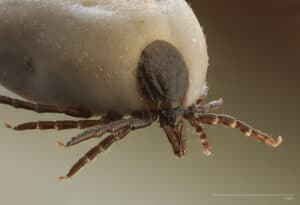Tick Bite Awareness

Tick Bite Awareness
As we head into Summer, the issue of ticks in the bush at Jarrahdale can become an issue. Ticks are parasites that feed on human and animal blood. A tick bite is usually harmless, but sometimes it can cause an allergic reaction or serious illness.
To avoid the irritation of a tick bite, there’s a few measures you can take to keep safe.
Prevention
- Keep your skin covered in areas where there might be ticks. Wear a long-sleeved shirt, tuck your trousers into your socks and wear a wide-brimmed hat.
- Avoid bush and long grass, especially after rain.
- Use an insect repellent that contains DEET or picaridin.
- You can put an insecticide that contains permethrin onto your clothes.
- Brush your clothes and check your skin for ticks when you come inside.
- Place clothes in a hot dryer for 20 minutes to kill ticks.
Treatment
If you have been outdoors and you have an itch, try not to scratch it. Look at the area first. Ticks in the larvae or nymph stages can be very small – they might look like just a black dot.
Unless you are allergic to ticks, there is no need to see a doctor. Remove the tick as safely and quickly as possible and keep an eye out for symptoms of tick-related illnesses (see below). Don’t scratch or pick at the tick.
If you are allergic to ticks, it is best to have a doctor remove the tick. You should have your emergency adrenaline autoinjector on hand and go to the nearest emergency department.
Remember that symptoms of other illnesses caused by the tick can develop or become worse after the tick has been removed.
Some people develop a serious allergy to meat and products containing gelatin after they have had a tick bite. This will need to be diagnosed by a doctor who specialises in allergies (called an allergist or immunologist).
For more information on ticks and tick bites, check this website or download the fact sheet here.

